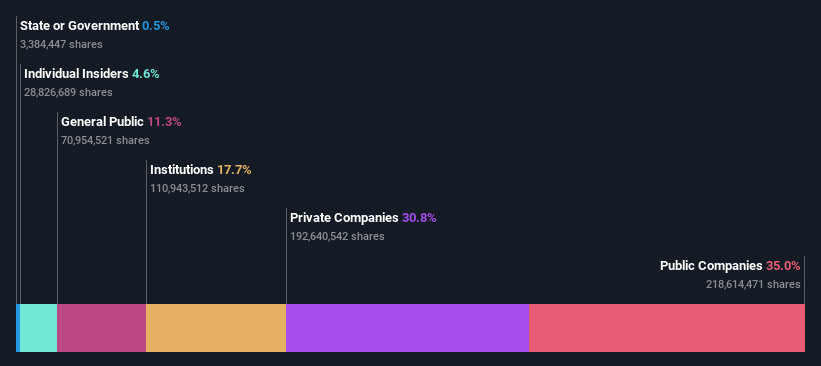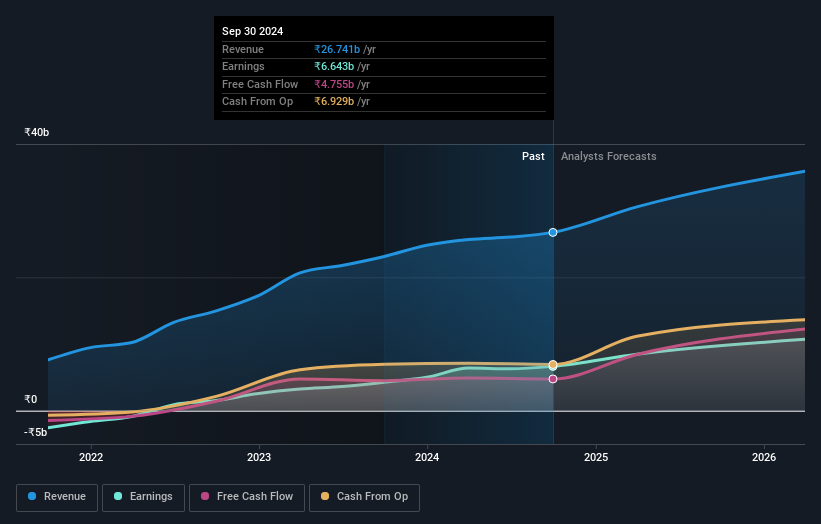- India
- /
- Hospitality
- /
- NSEI:EIHOTEL
Public companies in EIH Limited (NSE:EIHOTEL) are its biggest bettors, and their bets paid off as stock gained 4.2% last week

Key Insights
- The considerable ownership by public companies in EIH indicates that they collectively have a greater say in management and business strategy
- A total of 3 investors have a majority stake in the company with 53% ownership
- Institutional ownership in EIH is 18%
To get a sense of who is truly in control of EIH Limited (NSE:EIHOTEL), it is important to understand the ownership structure of the business. The group holding the most number of shares in the company, around 35% to be precise, is public companies. Put another way, the group faces the maximum upside potential (or downside risk).
Clearly, public companies benefitted the most after the company's market cap rose by ₹11b last week.
Let's take a closer look to see what the different types of shareholders can tell us about EIH.
Check out our latest analysis for EIH

What Does The Institutional Ownership Tell Us About EIH?
Institutional investors commonly compare their own returns to the returns of a commonly followed index. So they generally do consider buying larger companies that are included in the relevant benchmark index.
As you can see, institutional investors have a fair amount of stake in EIH. This suggests some credibility amongst professional investors. But we can't rely on that fact alone since institutions make bad investments sometimes, just like everyone does. When multiple institutions own a stock, there's always a risk that they are in a 'crowded trade'. When such a trade goes wrong, multiple parties may compete to sell stock fast. This risk is higher in a company without a history of growth. You can see EIH's historic earnings and revenue below, but keep in mind there's always more to the story.

We note that hedge funds don't have a meaningful investment in EIH. The company's largest shareholder is Reliance Industries Limited, with ownership of 19%. Meanwhile, the second and third largest shareholders, hold 18% and 16%, of the shares outstanding, respectively. Furthermore, CEO Vikramjit Oberoi is the owner of 0.9% of the company's shares.
After doing some more digging, we found that the top 3 shareholders collectively control more than half of the company's shares, implying that they have considerable power to influence the company's decisions.
While it makes sense to study institutional ownership data for a company, it also makes sense to study analyst sentiments to know which way the wind is blowing. While there is some analyst coverage, the company is probably not widely covered. So it could gain more attention, down the track.
Insider Ownership Of EIH
While the precise definition of an insider can be subjective, almost everyone considers board members to be insiders. Company management run the business, but the CEO will answer to the board, even if he or she is a member of it.
Insider ownership is positive when it signals leadership are thinking like the true owners of the company. However, high insider ownership can also give immense power to a small group within the company. This can be negative in some circumstances.
We can see that insiders own shares in EIH Limited. The insiders have a meaningful stake worth ₹12b. Most would see this as a real positive. It is good to see this level of investment by insiders. You can check here to see if those insiders have been buying recently.
General Public Ownership
With a 11% ownership, the general public, mostly comprising of individual investors, have some degree of sway over EIH. This size of ownership, while considerable, may not be enough to change company policy if the decision is not in sync with other large shareholders.
Private Company Ownership
We can see that Private Companies own 31%, of the shares on issue. It's hard to draw any conclusions from this fact alone, so its worth looking into who owns those private companies. Sometimes insiders or other related parties have an interest in shares in a public company through a separate private company.
Public Company Ownership
It appears to us that public companies own 35% of EIH. It's hard to say for sure but this suggests they have entwined business interests. This might be a strategic stake, so it's worth watching this space for changes in ownership.
Next Steps:
I find it very interesting to look at who exactly owns a company. But to truly gain insight, we need to consider other information, too. For example, we've discovered 1 warning sign for EIH that you should be aware of before investing here.
Ultimately the future is most important. You can access this free report on analyst forecasts for the company.
NB: Figures in this article are calculated using data from the last twelve months, which refer to the 12-month period ending on the last date of the month the financial statement is dated. This may not be consistent with full year annual report figures.
Valuation is complex, but we're here to simplify it.
Discover if EIH might be undervalued or overvalued with our detailed analysis, featuring fair value estimates, potential risks, dividends, insider trades, and its financial condition.
Access Free AnalysisHave feedback on this article? Concerned about the content? Get in touch with us directly. Alternatively, email editorial-team (at) simplywallst.com.
This article by Simply Wall St is general in nature. We provide commentary based on historical data and analyst forecasts only using an unbiased methodology and our articles are not intended to be financial advice. It does not constitute a recommendation to buy or sell any stock, and does not take account of your objectives, or your financial situation. We aim to bring you long-term focused analysis driven by fundamental data. Note that our analysis may not factor in the latest price-sensitive company announcements or qualitative material. Simply Wall St has no position in any stocks mentioned.
About NSEI:EIHOTEL
EIH
Owns and manages hotels and cruisers under the Oberoi and Resorts brand names in India and internationally.
Flawless balance sheet with solid track record and pays a dividend.
Similar Companies
Market Insights
Community Narratives




